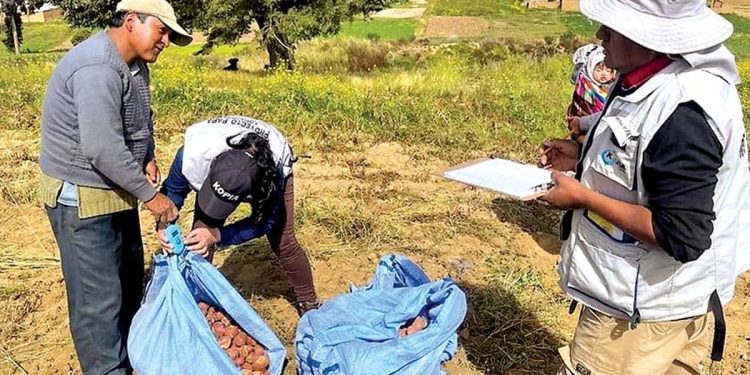#AgriculturalInnovation #PotatoFarming #BoliviaAgriculture #KoreanTechnology #Aeroponics #SustainableFarming #FarmersCollaboration #CropProductivity #AgriculturalDevelopment #INIAF
Bolivia, renowned for its diverse native potato varieties, faces a challenge in maximizing agricultural output per hectare compared to neighboring countries like Peru. In response, Kopia Bolivia Center and the National Institute of Agricultural and Forestry Innovation (INIAF) initiated the project “Establishment of model communities for increased potato cultivation productivity through the use of high-quality seeds and appropriate technologies in five departments of Bolivia.”
The project, with an investment exceeding $1.5 million, focuses on implementing cutting-edge Korean aeroponic technology to produce high-quality potato seeds. This innovative approach, extending from 2022 to 2025, aims to elevate both yield and seed quality, addressing the country’s struggle to meet local demand.
Limbert Juárez, the project lead from Kopia and INIAF, emphasizes the concentrated, high-humidity aeroponic system’s significance. In the city of Tarata, Cochabamba, the innovation centers produce cardinal, desireé, jatun puka, and marcela varieties, delivering genetically superior seeds to farmers.
“This seed has high genetic value in terms of yield and resistance. We’ve chosen varieties that are commercially viable nationally,” explains Juárez.
The initiative goes beyond conventional farming methods. It encourages farmers to adhere to specific regulations, ensuring optimal production conditions, disease-free crops, high-quality seeds, and proper agronomic management.
Bolivia, the second-highest consumer of potatoes in the region, faces lower yields due to a lack of appropriate technology. Juárez believes that adopting comprehensive production technology could transform Bolivia’s agricultural landscape, leveraging its fertile soils.
As the project progresses, Kopia collaborates with INIAF to ensure its sustainability. In the second year, goals include planting 200 hectares with certified R1 category potato seeds and 68 hectares with B2 category seeds.
In parallel, the annual meeting evaluating projects funded by the Korean Alliance for Agricultural Innovation (Kopia Bolivia) in La Paz showcased two additional initiatives for 2023. One focuses on rice cultivation with rainwater harvesting, and the other targets forage production. Both projects emphasize Korean technological cooperation to enhance farmer income and product quality.
Bolivia’s agricultural landscape is undergoing a transformative journey, fueled by innovative Korean technology. The aeroponic potato cultivation project led by Kopia and INIAF signifies a crucial step towards increasing productivity and elevating the quality of agricultural products. As these initiatives unfold, the collaboration with Korean expertise holds the promise of reshaping Bolivia’s agricultural future.







